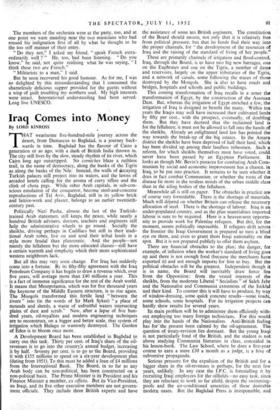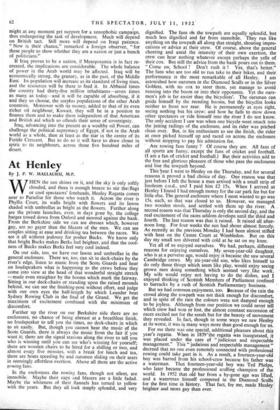Iraq Comes into Money
By LORD KINROSS THAT wearisome five-hundred-mile journey across the desert, from Damascus to Baghdad, is a journey back- wards in time. Baghdad has the flavour of Cairo a generation or so ago, with a dash of British India thrown in. The city still lives by the slow, steady rhythm of its river, which Cairo long ago outstripped. No corniches blaze a ruthless trail, in the name of democracy, along the banks of the Tigris as along the banks of the Nile. Instead, the walls of decaying Turkish palaces still project into its waters, and the lawns of arcaded hotels calling for the aroma of curry tiffins and the clink of chota pegs. While other Arab capitals, in sub-con- scious emulation of the conqueror, become steel-and-concrete reproductions of Tel Aviv, Baghdad, still in its yellow brick- and lattice-work and plaster, belongs to an earlier twentieth- century past.
Politically Nuri Pasha, almost the last of the Turkish- trained Arab statesmen, still keeps the peace, while nearly a hundred British advisers, doctors, teachers and engineers still help the administrative wheels to go round. Socially the sheikhs, driving perhaps in Cadillacs but still in their tradi- tional Arab robes, live on and tend their tribal lands in a style more feudal than plutocratic. And the people—not merely the fellaheen but the more educated classes—still have a certain warmth and simplicity which their more sophisticated western neighbours lack.
But all this may very soon change. For Iraq has suddenly come into a fortune. By its fifty-fifty agreement with the Iraq Petroleum Company it has began to draw a revenue which, over five years; will average more than £40 millions a year. This is a fact of immense significance for the rest of the Arab world. It means that Mesopotamia, which was for five thousand years the keystone of the Middle Eastern structure, is to rise again. The Mongols transformed this fertile land " between the rivers " into (in the words of Sir Mark Sykes) " a place of mounds and sherds, a waste of unfruitful waters intersecting plains of dust and scrub." Now, after a lapse of five hun- dred years, oil-royalties and modern engineering techniques are to reconstruct, on a bigger and better scale, that system of irrigation which Hulagu so wantonly destroyed. The Garden of Eden is to bloom once more.
A Development Board has been established in Baghdad to carry out this task. Thirty per cent. of Iraq's share of the oil- revenues is to go into the country:6 annual budget, increasing it by half. • Seventy per cent. is to go to The Board, providing it with £155 millions to spend on a six-year development plan (dating from 1951). To this must be added a loan of £4 millions from the International Bank. The Board, in so far as any Arab body can be non-political, has been constructed on a non-political basis. The Prime Minister is its President and his Finance Minister a member, ex officio. But its Vice-President, an Iraqi, and its five other executive members are not govern- ment officials. They include three British experts and have the assistance of some ten British engineers. The constitution of the Board should ensure, not only that it is relatively free from political pressure, but that its funds find their way into the proper channels, for " the development of the resources of Iraq and the raising of the standard of living of her people."
These are primarily channels of irrigation and flood-control. Iraq, through the Board, is to have two big new barrages, one on the Euphrates and one on the Tigris, a number of dame and reservoirs, largely on the upper tributaries of the Tigris, and a network of canals, some following the traces of those destroyed by the Mongols. She is also to have roads and bridges, hospitals and schools and public buildings.
This coming transformation of Iraq recalls in a sense the transformation of Egypt, by the construction of the Assouan Dam. But, whereas the irrigation of Egypt enriched a few, the irrigation of Iraq is designed to benefit the many. -Within ten years the Iraqis may well have increased their cultivated lands by fifty per cent., with the prospect, eventually, of doubling them. But they have decreed that the reclaimed land is for the fellaheen; it must not be allowed to fall into the hands of the sheikhs. Already an enlightened land law has pointed the way towards the break-up of the big estates. In the Amara district the sheikhs have been deprived of half their land, which has been divided • up among their landless tribesmen. Such a reform, for which sheikhs themselves must have voted, could never have been passed by an Egyptian Parliament. It looks as though Mr. Bevin's panacea for combating Arab Com- munism by social and economic improvement has a chance, in Iraq, to be put into practice. It remains to be seen whether it does in fact combat Communism, or whether the roots of tho disease lie more in the restless minds of the urban middle class than in the ailing bodies of the fellaheen.
Meanwhile all is still on paper. The obstacles in practice are of course very formidable. There is the shortage of materials. Much will depend on whether Britain can release the necessary allocation of steel. There is the shortage of labour. Iraq is an under-populated country, and as the plan materialises imported labour is sure to be required. Here is a heaven-sent opportu- nity to provide work for Palestine refugees. But this, for the moment, seems politically impossible. If refugees drift across the frontier the Iraqi Government is prepared to turn a blind eye on them, and even to grant them Iraqi nationality on the spot. But it is not prepared publicly to offer them asylum.
There are financial obstacles to the plan; the danger, for example, of inflation when the worker's standard of living goes up and there is not enough food (because the merchants have exported it) and not enough imports for him to buy. But the political obstacles will be the greatest. Independent though it is in name, the Board will inevitably draw fierce fire from the Opposition: from the vested interests of the sheikhs, from the moderate Liberal " Socialists " of Saleh Jabr and the Nationalist and Communist extremists of the Istiklal and their kind. To counter this it will have to produce, by way of window-dressing, some quick concrete results—some roads, some schools, some hospitals. For its irrigation' projects can hardly show results for several years.
Its main problem will be to administer them efficiently with- out employing too many foreign technicians. For this would play into the hands of the Nationalists. Anti-British feeling has for the present been calmed by the oil-agreement. The, question of treaty-revision lies dormant. But the young Iraqi is not particularly fond of the British, and the student is not above studying Communist literature in class, concealed in his lesson-book. The Law School, where he does a five-year course to earn a mere £30 a month as a judge, is a hive of subversive propaganda. . .
Serious pressure for the expulsion of the British and for a bigger share in the oil-revenues is perhaps, for the next few years, unlikely. In any case the I.P.C. is forestalling it by recruiting Iraqi employees for the oilfields—no easy task, since they are reluctant to work so far afield, despite the swimming- pools and the air-conditioned amenities of these desirable modern oases. But the Baghdad Press is irresponsible, and might ,at any moment get support for a xenophobic campaign, thus endangering the task of development. Much will depend on British tact. Still more will depend on Iraqi patience. " Now is their chance," remarked a foreign observer, " for these people to show whether they are a nation or just a bunch of politicians:" If Iraq proves to be a nation, if Mesopotamia is in fact re- created, the implications are considerable. The whole balance of power in the Arab world may be affected. Iraq will be economically strong, the granary, as in the past, of the Middle East. Its population will increase as its standard of living rises, and the resources will be there to feed it. In Abbasid times the country had thirty-five million inhabitants—seven times as many as today—and it will be capable of absorbing, if it and they so choose, the surplus populations of the other Arab countries. Moreover with its money, added to that of its even richer oil neighbour, Kuwait, they will be in a position to finance them and to make them independent of that American and British aid which so offends their sense of sovereignty..
Iraq, advancing into the present as a wealthy oil Power, can challenge the political supremacy of Egypt, if not in the Arab world as a whole, then at least as the star in, the centre of its Fertile Crescent. But to do so it will have to draw closer in spirit to its neighbours, across those five hundred miles of desert.








































 Previous page
Previous page